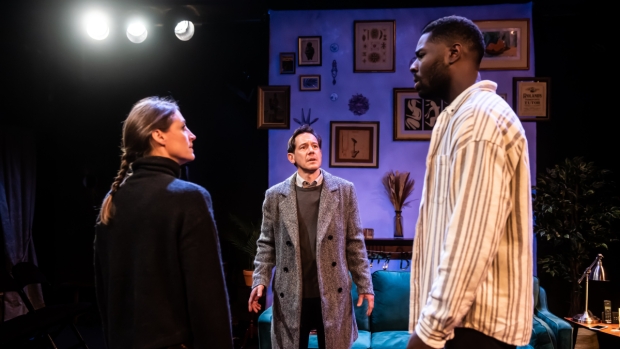
© Lida Crisafulli
From Greek tragedy through Shakespeare and the Jacobeans to Victorian melodrama, soap opera and Hollywood thrillers, revenge has been a staple theme of popular drama for centuries. Now here's Carey Crim's Never Not Once, a meaty modern treatment of the subject that feels timely, particularly in the light of the #MeToo movement. First seen on the USA's West Coast pre-pandemic, it's now receiving a UK premiere at the Park, in a strong but sensitive production by Katharine Farmer.
Crim sets the scene carefully, painting an affectionate portrait of a bi-racial lesbian couple, urban professionals in early middle age, about to make love but having their evening disrupted by the unexpected arrival of their daughter with her new college boyfriend. These people are highly agreeable company, likeable, relatable, humorous and with integrity. This matters because what follows threatens to rip this loving family unit apart, and it proves difficult not to become emotionally invested.
Eleanor (imbued with an irresistible warmth and energy by Meaghan Martin) has always known Nadine and Allison (Amanda Bright and Flora Montgomery, both tremendous) as her parents but now feels it's time to discover her biological father, a subject on which her birth mother Allison is uncharacteristically muted. It turns out that the circumstances of Eleanor's conception were neither loving nor consensual as far as Allison was concerned, and protecting her daughter has been at the forefront of most of her decisions.
When Eleanor discovers the truth, in a tumultuously well acted and written scene, the title of the play – Never Not Once – becomes clear as she asks Allison if she ever regretted keeping her as a baby. This follows on from a potent exchange between Allison and her daughter's father Doug, in which Montgomery charts the woman's fury with a magnificent, white-hot intensity.
In such a powerfully female-driven piece, the men could come in for very short shrift, but Crim is too accomplished and humane for that. Rob, the boyfriend, in an utterly winning performance from Gilbert Kyem Jnr, is a real gem, a young jock who doesn't always make the right choices but proves a true ally to the women and especially his beloved Eleanor. The deeply flawed father figure, a recovering alcoholic, unable to accept first that he even has a daughter and then refuting the accusation of rape, is more complex, and therefore less satisfactory, although that is a weakness in the writing, and not in Adrian Grove's courageous performance. It feels implausible that he would turn up at the women's home after that coruscating earlier encounter with Allison, but Grove inhabits the moment with complete conviction.
In its latter stages, the play lurches uncomfortably close to actual melodrama, which is a shame as up to that point it seldom puts a foot wrong. Then again, these are big, knotty themes accompanied by big, tempestuous emotions, but they would probably play better in a larger house. Despite these reservations, this is still a finely acted piece of theatre, impassioned, angry but kind, and inextricably attached to the zeitgeist.













